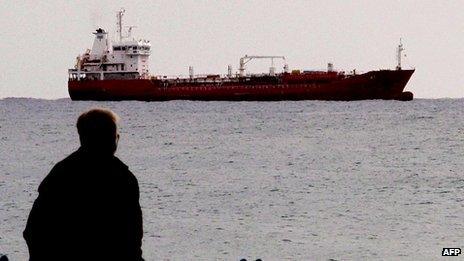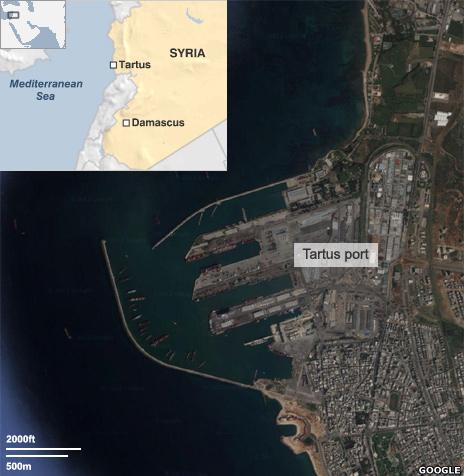How vital is Syria's Tartus port to Russia?
- Published

Tartus is the main docking point for Russian shipments
Since Syria erupted into conflict last year, diplomats, spies and military strategists have struggled to work out what lies behind Moscow's staunch support of its Middle Eastern ally, the Syrian government of President Bashar al-Assad.
Mention is frequently made of Russia's Mediterranean naval facility at the Syrian port of Tartus which, along with multi-billion-dollar arms sales to Damascus, runs the argument, is why Russia will never abandon the Assad government.
Not so, says a respected Moscow military think tank.
"Tartus is not a real naval base," says Ruslan Aliev, the head of information at the well-connected Centre for Analysis of Strategies and Technologies (CAST) in Moscow.
He told the BBC: "It is just a point on the map to replenish food and water and carry out some occasional repairs. There are a maximum of 50 Russian sailors and specialist technicians there.
"It is just a symbolic place after the collapse of the Soviet Union (in 1991), showing we still have somewhere to send our ships. From a strategic point of view [Tartus] is insignificant."
This view contrasts sharply with the widely-held belief that Moscow will do all it can to hold on to its only foothold in the Mediterranean.
Just this week, the commander-in-chief of the Russian navy, Vice-Admiral Viktor Chirkov, was quoted by Russian news agency RIA-Novosti as saying: "This base is essential to us; it has been operating and will continue to operate."
'Nostalgia'
A report published on 27 June by Radio Free Europe/Radio Liberty says: "Russia's greatest strategic and geopolitical interest in Syria is the use of a deep-water port at Tartus".

That report goes on to say that Tartus can dock nuclear submarines, it is the receiving point for Russian weapons shipments to Syria and it is linked to a well-developed network of roads and railways.
So what exactly is there at Tartus?
A quick glance at satellite imagery on the internet shows a well-ordered harbour with three piers just north of the town, which itself lies on Syria's Mediterranean coast between Lebanon to the south and Turkey to the north.
It is big enough to take in a missile cruiser but unlike the port facilities used by the US Navy's 5th Fleet in the Gulf, it is not big enough for an aircraft carrier.
Under a 1971 deal with Syria, Russia has leased the Tartus facility as part of a multi-billion-dollar debt write-off.
Thousands of Russians live and work in Syria, many working on defence contracts, maintaining and upgrading weaponry already supplied, but there appear to be relatively few at Tartus.
Video footage taken on a recent visit by Russian journalists shows a sleepy, half-deserted port with ageing Russian trucks, an officer's overgrown orchard and a few decrepit supply hangars.
"The Western media have got it all wrong in portraying Tartus and arms sales to Syria as a major reason why Russia is standing by the Assad regime," says Ruslan Aliev.
It is about nostalgia for former Soviet power, he insists.
In a report being circulated to Russian defence chiefs, CAST argues that Russia does not actually have a major strategic stake in Syria, and that its support for President Assad is based more on emotion than logic.
"No-one in Russia really thinks Assad is a good or helpful guy," concludes Mr Aliev.